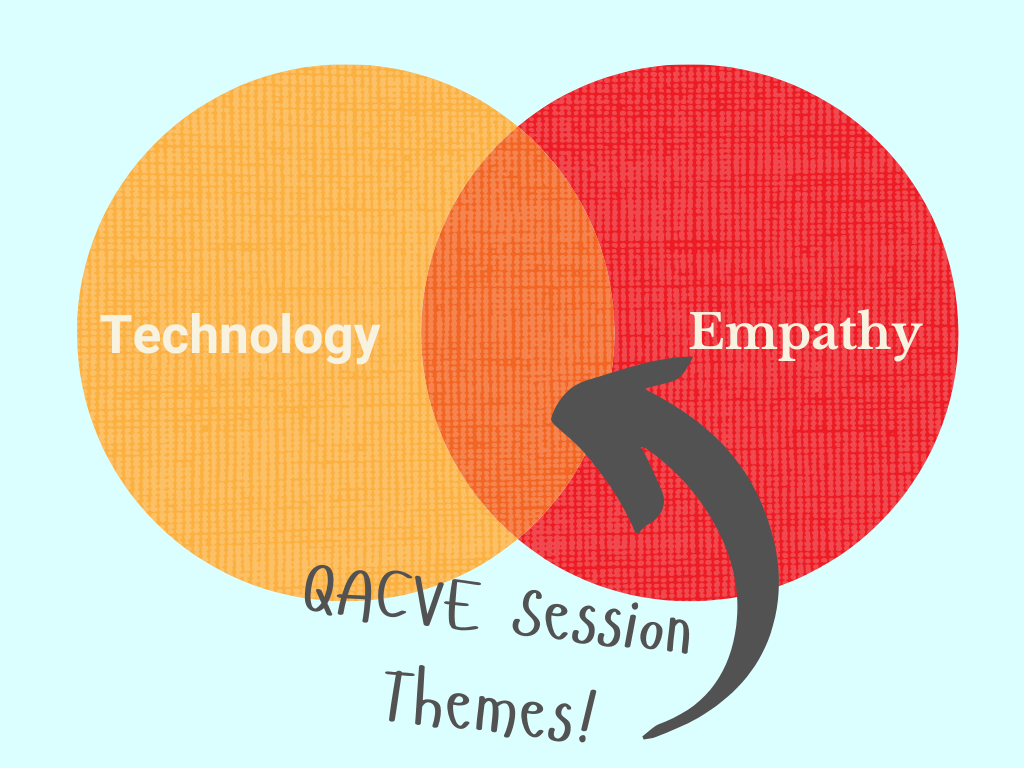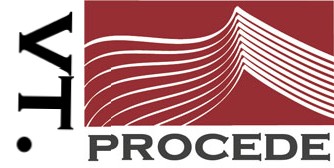The Venn Diagram of Technology and Empathy

Hello everyone!
For our second post on the QACVE conference, let’s talk about the sessions! We had some great formal learning moments during our keynote, workshops and presentations and I encourage you to check out the resources shared by the presenters in the QACVE group. For a quick overview, keep on reading!
Session Highlights
Keynote highlights
A conference favourite, Isabelle Fontaine, kicked off the conference as our high-octane keynote speaker. We explored the intersection of performance psychology, emotional intelligence and neuroscience and participated in collective activities that helped us become our best battery chargers! After a supercharged 3 hours with her, we moved on to the sessions, animated by fellow teachers and consultants:
Session A highlights
- Nicolai Nikolov, commercial and residential drafting teacher at VACC in the Lester B Pearson School Board (LBPSB) shared practical approaches to minimize stress in International Students, looking at potential sources of stress for international students and finding ways to make their learning experiences more comfortable.
- Susan Oliver, educational consultant and Colleen Scott, healthcare teacher, both from WICC in the LBPSB, presented an interactive, multimedia conversation about what we can do to create inclusive learning environments that are good for all learners but especially relevant for neurodivergent learners.
- Gurpreet Mand, Sylvia Meyer, Catherine Ross and Ellen Tissenbaum, all healthcare teachers at PACC in the LBPSB, discussed how PACC’s approach to clinical simulations in the healthcare training lab enhances student learning and confidence in a psychologically safe environment.
- Maan Hatab, computing support teacher at CDC Pont Viau at the Sir Wilfred Laurier School Board (SWLSB), presented issues around equity and inclusion in our current common digital systems in vocational training and provided alternative, open-source solutions.
- Marc Vézina, RÉCIT VT educational consultant and former professional cooking instructor at the LBPSB, explored using a class website to promote student engagement in a lab or shop-based vocational training program.
- James Burn, RÉCIT VT educational consultant and Lucie Tremblay, student special needs consultant with the Complementary Educational Services team (SEC) walked the participants through different technology tools that can help all students in their learning.
Session B highlights
- Mariam Ungarte, healthcare teacher at PACC in the LBPSB, engaged us in discussions on how to foster an inclusive learning experience using Hofstede’s cultural framework.
- Kelly Ryan, educational consultant; Jane Fairhurst, av councillor; Danielle Boak, healthcare teacher; Denise Chavez, horticulture teacher; and Darren Pinkham, construction teacher all at the New Frontiers School Board (NFSB), explored how a structured student orientation benefits learners and educators, creating a harmonious and motivating learning environment.
- Chelsea Thompson, a business programs teacher at WICC in the LBPSB, presented various artificial intelligence (AI) technology tools that increase efficiency in education and in the workforce.
- James Burn, RÉCIT VT educational consultant, had us experience mixed reality through virtual reality scenarios specifically designed for vocational training
- Maria Pina Mercogliano, evaluation consultant at la Banque d’instruments de mesure (BIM), presented us with how Universal Design for Learning (UDL) concepts are implemented in BIM examinations to improve success rates.
- Lucie Tremblay, student special needs consultant, and Martine Veillette, psychoeducator, both from the SEC team, showed us how understanding student behaviours and acknowledging their diverse backgrounds is crucial to supporting their academic success.
Session C highlights
- Elizabeth Cameron and Joseph Rainone, automated systems electromechanics teachers at RTC in the English Montreal School Board (EMSB) and Guy Rocher, aerospace engineer and former automated systems electromechanics teacher helped us explore a department’s journey to better understand evaluating student performance and their approach to collective professional development as VT teachers.
- Chris Gill, a teacher at Lennoxville Vocational Training Centre at the Eastern Townships School Board (ETSB) framed out teacher leadership by introducing us to concepts of psychological safety and how it relates to classroom climate and group learning.
- Marie-Josée Bourassa, project development officer, Jo Anni Joncas, professor at the Université de Sherbrooke, and Diane Labelle, education consultant at the First Nations Adult Education School Council presented an innovative partnership that developed training designed to promote respectful partnerships in vocational training in Indigenous contexts.
- James Burn and Marc Vézina, RÉCIT VT educational consultants explored the essentials of artificial intelligence for educators in vocational training.
- Nolan Bazinet, professor; Annie Cazenave-Longval, consultant; Xavier Michel Grisé and Alexandre Alves Mesquita, education consultants; and Bonnie Mitchell, assistant director of academics all from the Université de Sherbrooke gave us an overview of the English language Bachelor’s of Vocational Education and the benefits for a teaching career in vocational training.
What are your memorable moments and key takeaways from the sessions?
Thanks for the read,
📱👩🍳 Robin

Responses